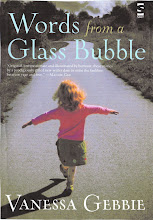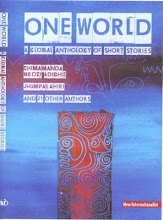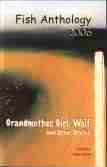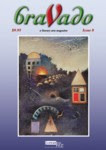
Continuing the Really Interesting Elephant Trap Discussion About Creativity With Or Without White Peacocks Which Was Not Intended To Be A Debate At All, on Sara Crowley’s blog last week, HERE.
Zimbabwean writer Petina Gappah adds a considered post to the discussion thread, and finally, we have an actual piece of work to illustrate the issues. Maiba's Ribbon, by meself.
Petina says this:
“the characters were Zimbabwean only because the writer (says) so, even their names were wrong, a sort of pidgin Shona in a country with no pidgin! I was not offended by the stories, but I was amused ... amused in the way I am when I read Dan Brown's plastic characters. My reaction was not about "cultural" authenticity, it was simply a reaction to (…) writing that seemed to want the exotic setting without going for any kind of truth in the characters.”
That is good feedback. And an important learning point, among other important learning points - not to trust one’s sources of info on the internet. The names were found on this rather jazzy website HERE which lists Zimbabwean children’s names and their meanings. If they are incorrect, that is bad enough, but if they are ‘pidgin Shona’ that is worse - no wonder Petina laughed. It is sad if there is no other truth in the characters in her opinion - which matters - and as always, this writer will try to do better.

But this raises the question, how accurate do we have to be in general, as writers? Does it matter, in general? If the story worked as fiction for a few editors and their readers, where is the issue? Yes, it matters to me, personally, because I don’t like to get it wrong – but I’m learning, here.
Edited to add: the piece Maiba's Ribbon is leaning very much on those names, to paint character. And if those names are wrong, it might not work. I asked Petina Gappah the obvious question: "Where can I find out the right versions of those names?" and Petina has pointed out that actually Godfrey and Elizabeth would be as authentic, because English is an official language... and that challenges the writer here, to look again, and see how 'authentic' the characters are if I give them those names instead. Hmmm.
A bit of history: This story was published initially on Foto 8 online, (Foto 8 is a photojournalism magazine) to illustrate working with images as prompts for creative writing. It was included in a special series on Notes on the Underground edited by Clare Wigfall. And performed at Whitechapel Gallery last week - I'd forgotten that, couldn't be there...The point is, the fiction convinced well enough, until it hit ‘home territory’. And sure, that’s not exactly what I wanted to hear.
Petina makes the point that the story probably wasn’t intended for Zimbabwean readers – and she’s right, in that it wasn’t ‘intended’ for anyone at all. I saw the photo, knew roughly what the story would be – looked up the names before I wrote the flash. Then I was asked to send work to Foto 8 and so on..
But, and it is a big but - I ask myself the question – would I have sent it to a publication in Zimbabwe? The answer to that has to be ‘no of course not’. Then I ask myself why that is.

There are a lot of questions here, and I don’t have the answers.
• If you are moved by something and seek to understand it - is it OK to try and write a character from another culture, get it wrong unwittingly and hope to do it better next time?
• Is it somehow more ‘respectful’ to assume that you will never get it completely right, that someone will be offended, and therefore you should (as a writer) avoid otherness completely?
• Isn’t it by making mistakes that we learn?
• If we worry about offending, we’d never write anything, would we?
• If we don’t worry about offending at all, are we just being exploitative?
• Where should we worry and where shouldn’t we? Where is the cut-off?
• Are there some mistakes that are less easily forgiven than others?
Clare Wigfall, in her interview in Short Circuit, talks about The Numbers, the short story set in the Outer Hebrides which won The National Short Story Award in 2008. She created a fictive world that worked well at the highest level. Having visited the islands where The Numbers was set, after the story was published in her collection, (The Loudest Sound and Nothing, Faber and Faber), she discovered that in terms of voice, things were not exactly accurate. She knows that geographically, too, there were things ‘wrong’ if one was looking for facts. But, she says, sensibly,
“I never aimed at correctness. I just wrote fiction.”
Sometimes, writing is a minefield. People will be offended, when no offence is intended. How many times have I cringed, when ‘my’ subjects – adoption/abandonment are the most obvious - are tramped all over by writers who have no idea? I may cringe - but I have not been ‘offended’. If the writers asked, I’d give them the facts as I see and experience them. For example, I spent a few hours talking to the author Nicky Singer, researching for one of her novels.
"Other" is part of why we write. There’s something pushing us to make up other people… whether they are people who live our lives, in our homes, lives like ours, or others – I do the latter. And sometimes, as now, you have to stand up and be counted.
If you want to find out more about writing ‘other’, here are two thoughts –Petina Gappah’s course on Writing Other Lives with Faber has sadly come and gone, but it sounded great – maybe they will run it again -
And thanks to N for this great article by black writer Leone Ross on tackling a black main character, (she is black). A black male main character (she isn’t a black male). A gay male main character (she isn’t a gay black male). An American gay black male. (she isn’t American, but Jamaican. She only visited the US once, as a tourist. Florida. Nuff said.)
Cultural tourism. A minefield. And a large one. I hope we are all allowed to walk the edges, if we are brave or daft enough.








.JPG)





















